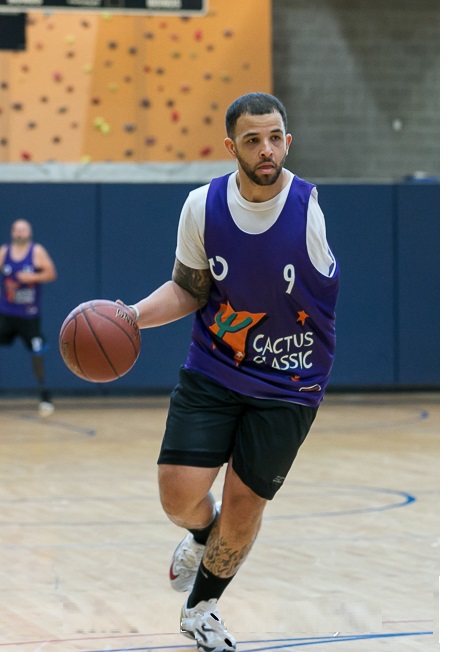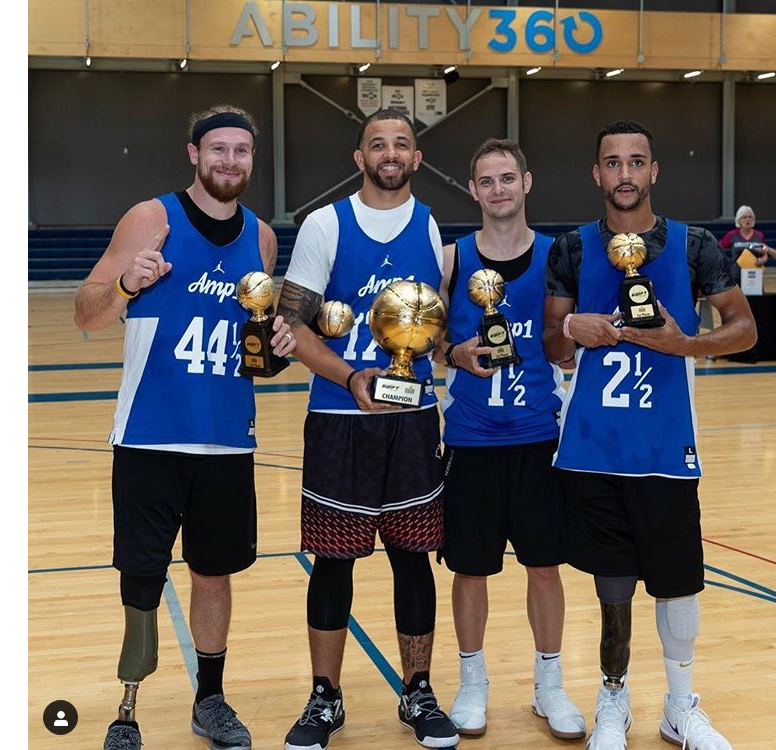
As the National Basketball Association prepares to resume its season tomorrow night after a 20-week pandemic pause, we can’t think of a better person to preview the playoffs than Troy Druppal.
A youth coach for the Golden State Warriors Basketball Academy, Druppal knows all too well what it’s like to play basketball through a health crisis. From the time he was diagnosed with osteosarcoma at age 14, he kept on shooting hoops through years of chemotherapy, remission, rediagnosis, and the amputation of his left arm at the shoulder. Although he wasn’t given much chance to live to see the age of 20, Druppal is now 30 years old and cancer-free. And still ballin’ as hard as ever.
For the last few years he’s traveled the country with AMP1, which bills itself as the nation’s only stand-up amputee basketball team. (Team founder Nick Pryor shared his story in Amplitude a few years ago.) Druppal also coaches a team of teenagers for MVP Flight, a youth league that operates throughout northern California. Plenty of NBA players know his story, so we reached out to him to get his thoughts about the upcoming playoffs, the future of stand-up basketball, and his personal journey from cancer patient to high-level competitor.
Our conversation has been lightly edited for length and clarity.
It looks like AMP1 has been on hold about as long as the NBA. Do you have any events on your schedule as of this moment?
Unfortunately, no. We had to cancel everything that we had planned for this spring and early summer. We had an event with the Phoenix Suns in March, as soon as the pandemic started. Shortly after that we had a trip planned to New York planned to do a charity basketball game with a YMCA group. We also had a trip to Riverside to do a camp with amputees. And then we had our 3-on-3 basketball tournament [the Cactus Classic] that we’ve been doing every summer, and that was canceled as well. That would have taken place earlier this month.
I’m not familiar with the 3-on-3 tournament. Is that a fairly new event?
It’s about five years old. We hold it at Ability360 in Phoenix, and it’s the only stand-up basketball tournament in the country. We have guys who came from Florida, Maryland, Tennessee, Colorado, New York, Oregon—basically all over. The goal is to grow it every single year and get as many amputees involved as possible.
I didn’t realize there were that many amputees playing stand-up basketball.
It’s not as well recognized as wheelchair basketball. For amputees, whether you’re above the knee or below the knee, it can be difficult to move in the same manner that able-bodied players are able to. But the current prosthetics have more spring in the leg, so they allow leg amputees to move more like they did before they lost their limbs. And for people like me, as an arm amputee, I’m not able to play wheelchair basketball. For me the outlet was always just to play against able-bodied people. No excuses, just go out and play.
Is the tournament open to anyone, or do you have to enter as part of a team?
Almost nobody who comes down is part of an actual team, they’re just players who want to be in the tournament. We assign everybody to a team with three or four guys, and it’s a two-day tournament. You play a minimum of ten games, and we kind of go bracket style—the more games you win, the deeper you advance. It’s a cool way to meet other amputees who play basketball at a high level. [The tournament will return in 2021, so keep an eye on AMP1’s Facebook page for information about how to enter. —Ed.]
Is there any advantage to playing stand-up ball as an upper-limb amputee versus a lower-limb?
Everybody brings something to the table. For me, not having two arms, I can’t do moves like a double crossover that takes both hands. For a leg amputee, they can’t move laterally as quick as I can or be as springy off both legs.
How did you become a member of AMP1?
I coach youth basketball camps around the Bay Area, teaching basic skills—how to dribble, shoot, pass, play defense. So I participated in a camp that AMP1 was hosting out here in the Bay Area, and they invited me to come down to the 3-on-3 tournament. My team ended up winning, and after that they kind of said, “We love what you can do, we think you’re a great person, we want you to join the team.” That’s how I got involved.
And did that lead to your gig with the Warriors Basketball Academy?
I kind of got involved with both organizations at once. On the same day I was at the AMP1 camp and got invited to their 3-on-3 tournament, some of the Warriors coaches were also there. So I got invited to an orientation to work as a basketball coach for the Warriors that summer.

That was a pretty good day.
That was a good day. I got two jobs in the same day. it was pretty cool.
Growing up in the Bay Area, were you a big Warriors fan? Did you see yourself as a future NBA player?
Oh yeah, absolutely. I definitely wanted to play at the highest level. I had my favorite players who I looked up to. My first Warriors game was in 2004. They had, let’s see, Mike Dunleavy, Troy Murphy, Adonal Foyle, Mickael Pietrus, Derek Fisher, Jason Richardson. . . . .
I don’t remember most of those guys.
Not many people do. They were not a great team. They hadn’t made the playoffs in a long time. But they made a big impact on my life.
How are you feeling about the resumption of the NBA? Do you have any prediction for who’s going to get to the NBA Finals?
I believe the Finals will be Lakers versus Celtics. I believe the Lakers have the experience, they have the best player in the NBA, and they have the best leadership. I think the Celtics will go because they are very young and athletic and have the most depth in their bench. I think they will be able to run and compete with any team.
My good friend Jaylen Brown plays for the Celtics, so I am rooting for them. However, LeBron James is my favorite player (and he even wrote me a letter), so I am rooting for them as well. So if they were both to be in the NBA Finals, I would not care who wins because I feel like I’d be happy no matter the outcome.
And what about the idea of playing inside the bubble. Do you feel like they’re going to keep everyone healthy and prevent the spread of COVID-19?
There’s no definite answer, unfortunately. There’s no guarantee that everything will go back to normal by a certain date. The pandemic overall has brought a lot of anxiety and depression, so this is a way for the NBA to give fans out there a sense of happiness. You won’t be able to attend games or see the players in person, but we’ll at least give you something to watch. Something that’s currently happening, instead of watching like NBA throwback games. You can only watch that for so much.
I’ve talked to several adaptive athletes who feel like they almost have an advantage in this pandemic over able-bodied athletes, because they already have had the experience of radical change in their lives. Is there a sense in which the NBA players could learn from AMP1’s players?
Yeah, absolutely. A lot of the kids that I coach don’t know about my past or what I’ve been through, so the director asked if I could kind of share my story. And I definitely related the pandemic to it. When you find out you’re losing an arm, you have to adapt to a new lifestyle forever. I feel like with this pandemic, it relates to that a lot. People are going to have to learn how to be more socially distant, even when things are opening back up in a sense. Trying to stay positive through these times is easier said than done.
You took an unconventional route to cancer recovery, discontinuing chemotherapy and pursuing more natural treatments. How did you decide to take that course?
I was just tired at that time. I had fought for so long, and it just seemed like everything I was doing was not getting me to the promised land where I thought I would be. it just came to a point where I was already missing out on so much in life. I got diagnosed in my freshman year of high school, and I continuously got diagnosed with something new all the way up until my senior year. And it was just—life is short, and I decided if I’m gonna go, I’m gonna go happy. I’m gonna go doing what I want to do. I’d rather die at home than in the hospital. At least when I’m at home, I’m doing something that makes me happy, and I’m spending my time in a place where I’m happy versus a place where I’m not happy. And that played a big role in my health. When you’re depressed and you’re not feeling up to doing anything, it takes a toll on how your body functions. It just felt like the right thing, to start doing what I wanted to do.
Other than rooting for the Lakers and Celtics, what’s keeping you busy these days?
My youth team just got approved to return to the gym, so that’s where I’m spending the majority of my time. We don’t have any contact during practice, but we can work on drills and fundamentals, socially distanced. It gives the kids a sense of peace and happiness to be in a gym instead of being at home. I had a great support system when I was facing health problems. My family and friends were always there, and that helped keep me going and took my mind off of things. So it feels good that I can be there for somebody else.




